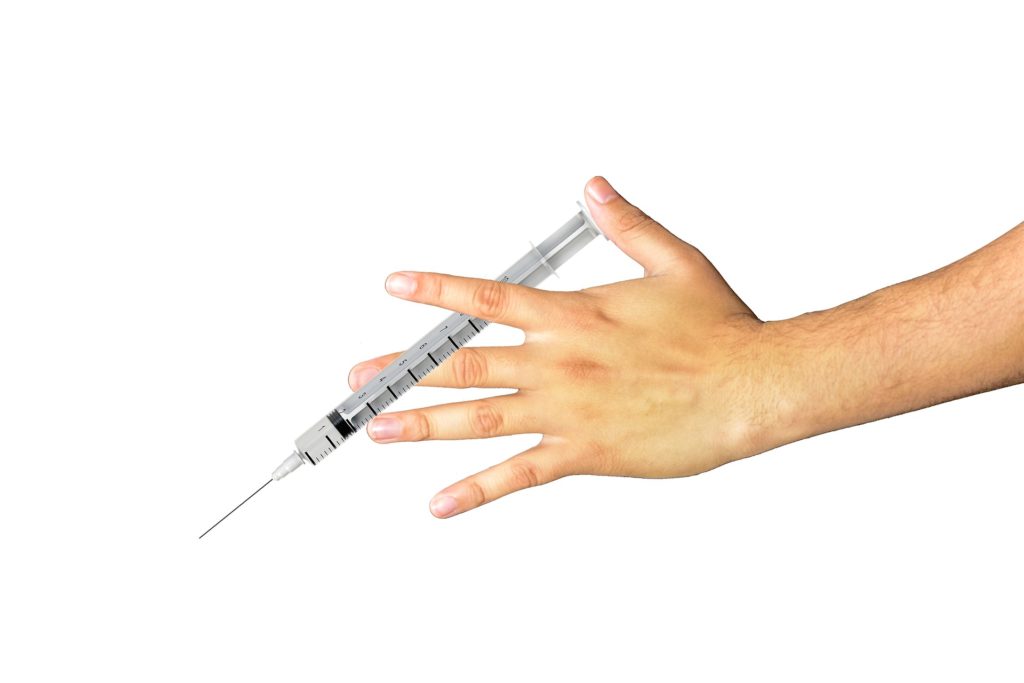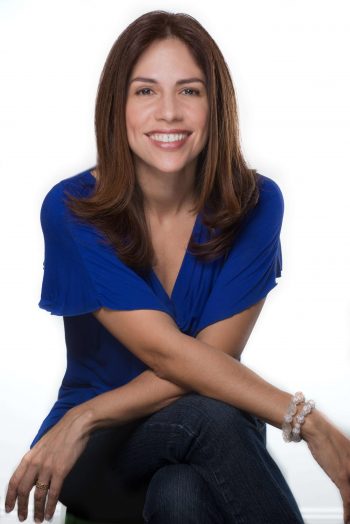We're All Faking It (And It's Okay): Stepping Out of your Comfort Zone

Sometimes a very small decision can change the course of your life. Especially if that decision requires stepping out of your comfort zone.
I was fifteen years old. I was afraid of needles and terrified of the sight of blood. Even the smell of isopropyl alcohol, which I associated with hospitals, made me shake. But I needed community service hours for high school graduation, and the fastest way to get them was signing up as a volunteer for the latest pediatric vaccination campaign.
Why would a self-respecting Public Health Department trust a 15-year-old girl to give intra-muscular injections to little children and babies? Don’t ask me. Irrationality comes with the Third World country. But the Dominican Republic Department of Health had no scruples entrusting me —and a handful of good-hearted, nearly illiterate volunteers— with the mission. All you needed was a two-session course.
In the two sessions, we the course participants practiced giving each other B12 injections in the arm. That’s the typical way to inject an adult. However, children under two (the target of the campaign) are supposed to get the injections in the thigh. So since we didn’t have any small children with whom to practice, the instructor showed us on a doll. “There. That’s where you put the needle in a kid,” she said, pointing at the doll’s mid outer thigh, and then sent us on our way.
(Sometimes, when my American-born friends want to complain about the imperfect US Health Care, I like to tell them this story).
We, the volunteers, had to carry the vaccines in a styrofoam cooler with some ice as the only protection from the Dominican Republic’s incinerating sun. For all I know, those poor kids may have been getting placebo. Thinking about it, knowing how corrupt the government in the DR has always been, I wouldn’t be surprised to find out that someone stole the real vaccines to sell them to a private clinic and what they gave us was only water. (Hey, don’t cry, that was supposed to be funny.)
Talk about stepping out of your comfort zone! There I was, all of 15 years, with a barely older buddy, knocking on doors in a scary slum. I wore a white coat on top of my clothes to make my youth and inexperience less obvious.
My parents would have never allowed me to go to a neighborhood like that on my own, but somehow the stamp of “volunteer service” had some power-field-like protective effect. Going around the block would have meant missing more than half the people, because behind every house there was another house, and then another in never ending layers. If poverty has a smell, that neighborhood reeked of it: the stench of deeply-set poor hygiene that “cuaba soap” couldn’t begin to erase.
The humble families welcomed us warmly and thanked us effusively each time. Some offered us fresh-squeezed fruit juice and coffee. Some people even tried to show me skin lesions or tell me about symptoms, tricked by my white coat into believing I was a doctor.
Each time I turned around after giving each injection, my hands would shake violently. I could barely manage to return the needles and syringes to the sharps disposal container – or the poor man’s version of that, a plastic gallon jug. Yet for the moment of putting the needle into the thigh of a crying kid, I had to force my hands to be still. I had to fake complete confidence in my skills. God forbid those poor, innocent people calling me “doctor” realized how little instruction I’d had.
Oh no! I thought constantly. These poor people have no idea of how little I know about what I am doing and in how much danger their kids are!

My father Diego, with his infamous people-torturing sense of humor, teased me for weeks after that. He’d say, with a straight face “I read in the newspaper that a bunch of kids from that neighborhood died inexplicably. The suspicion is that they died from ‘poorly performed injections given by barely trained people.’”
Yup. That was my dad.
As far as I know, the kids I injected did just fine — trust me, kids in Third World countries have the SWAT Team of Guardian Angels assigned to them (the fact that I made it to adulthood is proof of that). But you may have guessed by now what surprise came from that adventure. For the very first time in my life I challenged my own self-concept of being the cowardly girl. For the first time, I could picture myself working in healthcare. That led me to start considering a career option that, until then, was an absurd impossibility in my mind: Medical School.
And that’s the magic of stepping out of your comfort zone. It opens a whole new class of options which were previously unthinkable.
When you work in medicine that feeling of “These poor people trusting me have no sense of the danger they’re in” is a recurrent issue. I lived it again as a young medical student, the first time I sutured someone on my own, and the first few times I delivered babies (I was only 18).
Faking it—Faking complete confidence even if I was terrified inside —was the best gift of love I could give to a patient. They were having a hard enough day without having to find out that their “doctor” was a complete mess. I learned to fake that I knew what I was doing so well, they felt reassured. Then somehow, little by little, I gained enough practice that it became true.
So, maybe faking it wasn’t that bad after all.
“What’s your point?” you may be asking. “What does this have to do with the theme of these stories, Finding Love?” The answer is: sometimes the best gift of love you can give to yourself is faking that you know what you’re doing.

Let’s talk about faking. There is good faking and bad faking and the difference is very subtle. Bad faking is pretending to be something you’re not (or you believe you’re not), usually to gain acceptance from others. Good Faking is acting “as if.” It’s imagining an improved version of yourself, then acting like that person would, in order to graduate to a new level of you. Bad faking is often unconscious and arises from shame. It arises from a desire to hide something you perceive as an inadequacy. In Good Faking you know you know nothing, but you push yourself out of your comfort zone to learn-by-doing.
Faking it (good faking) has taken me anywhere I wanted to go.
To escape the DR’s health system and come to the US to train, I once had to interview with over a dozen hospital program directors. As you can imagine, they’re often reluctant to hire strongly-accented foreign medical graduates. I managed to convince many of them that, precisely because I was bilingual and a little exotic (you know, “a minority”) I was exactly what they needed. As hopeless as the statistics sounded to me, I faked to be a potential asset to their medical programs, and they bought it. I did the same years later with fellowship training programs and later on with potential employers.
Already graduated as a hematologist-oncologist I had to fake that I knew what I was doing to see patients by myself, without an attending to consult on. Rumor has it, I still looked thirteen despite being in my early thirties. I had to wear fancy clothes and put on tons of make up so people would believe it was true I was the doctor and not some teenage kid playing with her parent’s lab coat.
And the good news is that those faking skills can be transferred from one aspect of life to another. One day, as a thirty-something-year-old divorced woman, I had to launch myself into the world of dating. The truth is that I had no brothers, my closest guy friend in college was in-the-closet gay and I had married my very first boyfriend in my early twenties so I had no freaking idea of how to even talk to men out of a medical scenario. And there I was, signing up for online dating, faking that I knew what I was doing. I still can’t believe no one called my bluff and I still can’t believe I walked out of the experience having found my wonderful soulmate.
By the way, that wonderful man once confessed to me that in those early times after he first met my four children he had to fake it too. Sometimes he feared they were more than he could handle. After all, he’d been a child-free bachelor all his life and those kids screaming in high chairs and getting sick in the middle of parks were a lot to digest. Yet back then, he managed to fake absolute confidence. He kept showing up with a smile on his face, remote control cars to play with and kites to fly. No one would have ever guessed he had a shred of doubt in him. And now, nearly a decade later, he doesn’t have to fake it anymore. He’s the most amazing step father I’ve ever met.
And returning to my adventure vaccinating kids. Years later, when I made it to my first real class in medical school and received my official training on how to give intramuscular injections, it turns out they had actually taught me quite well. Almost everything I had learned at age 15, was what they taught me in this official class — the formal class was even shorter, one session only. I’d been beating myself up for years for having risked those kids with my inexperienced injections, and as it turns out, medical students walked around with even less instruction than I had back then. And, of course, I rocked that class. By then I’d faked so many times that I knew how to inject, now I was a real expert.

Maybe this post is not so much about stepping out of your comfort zone, as it is about cutting yourself some slack. Good faking requires a huge amount of that. Maybe we beat ourselves up too much. Maybe, as long as your intentions are pure and you’re open to learn, The Universe will provide what you need for success.
Whether your current goal is finding love, mastering a new job, raising a child or, like me, “pretending to be an author” just keep going. Keep smiling and keep faking that you know what you’re doing.
Love,
Diely

Reading this tears are falling in my heart because the truth is “you really get me,” or like the saying goes, “fake it till you make it” is so true. This explanation of your experience as a child into adulthood is inspiring and encouraging. Thank you and keep writing ✍. Wish I could be 1 of the winners of the 2 free books gveaway.
Thank you, Althea! Your comment made my day!
Pingback: Opening the mind - D Pichardo-Johansson, Author